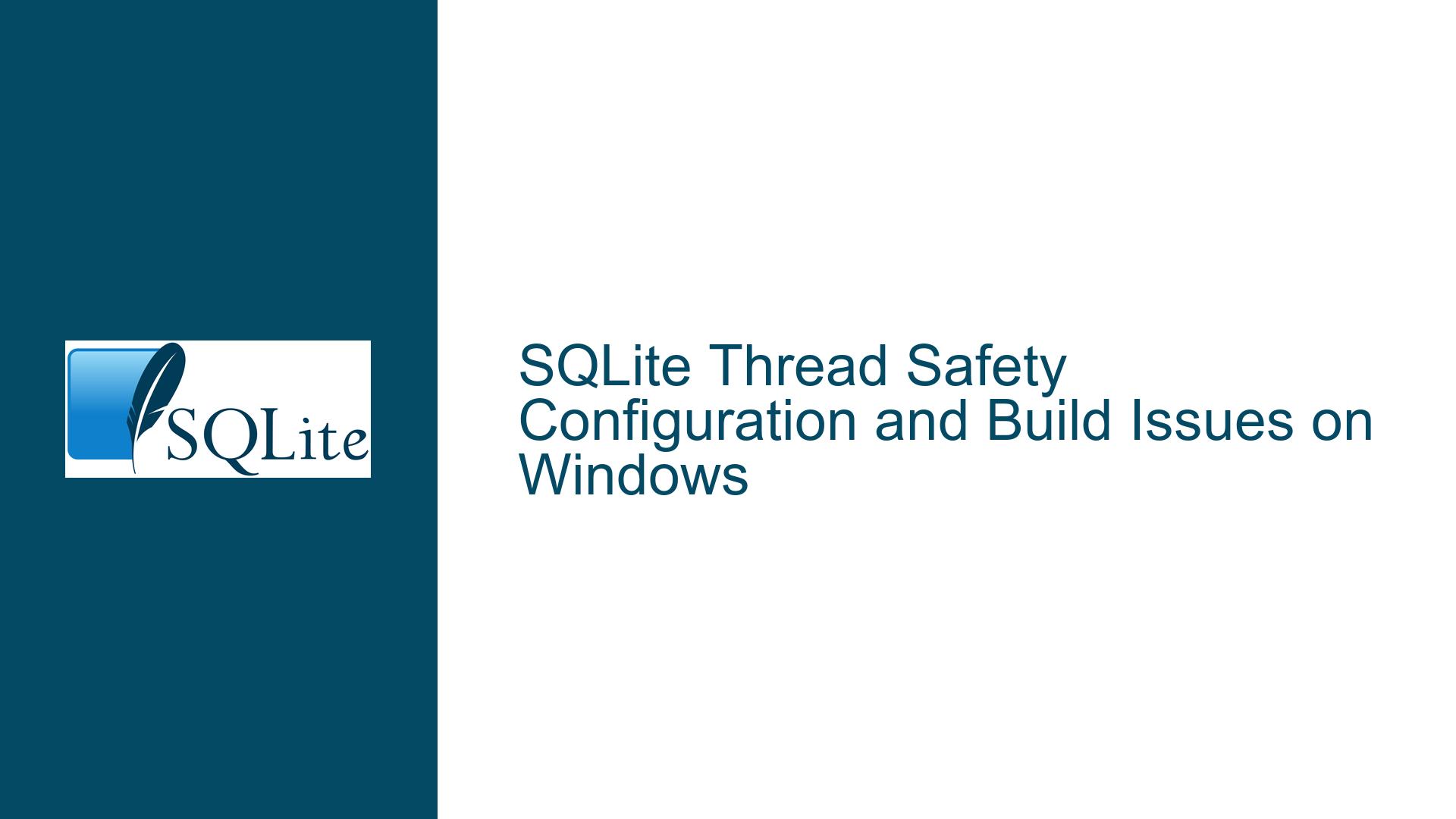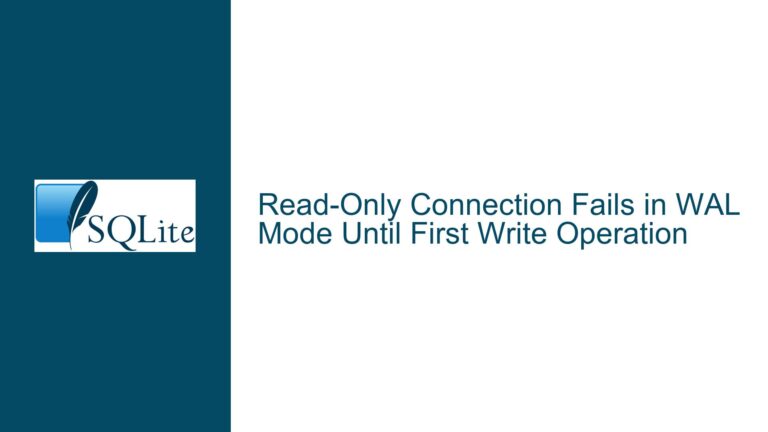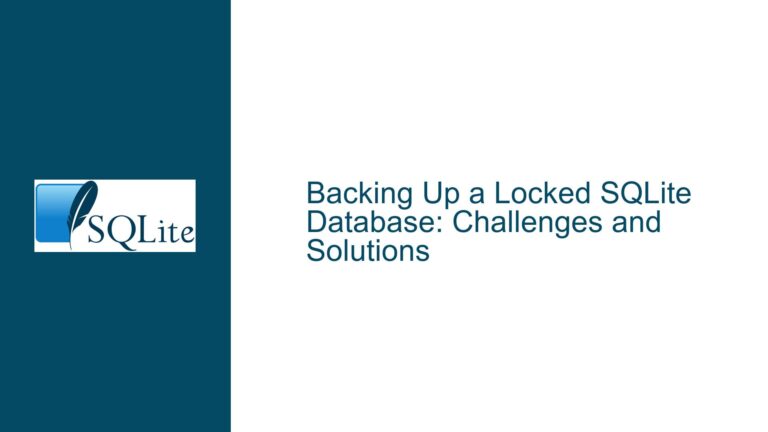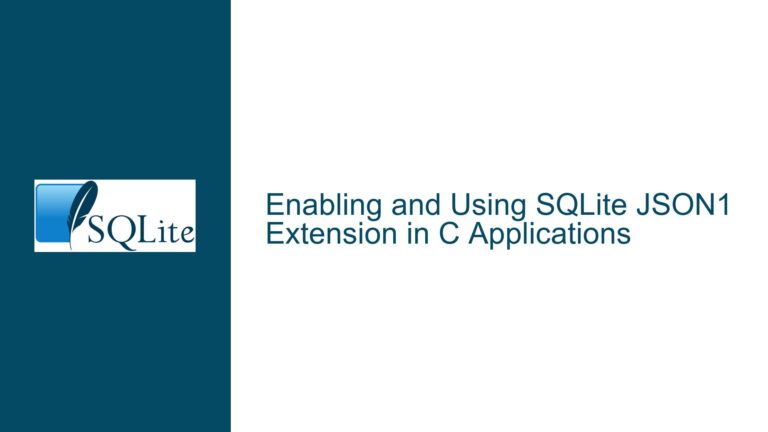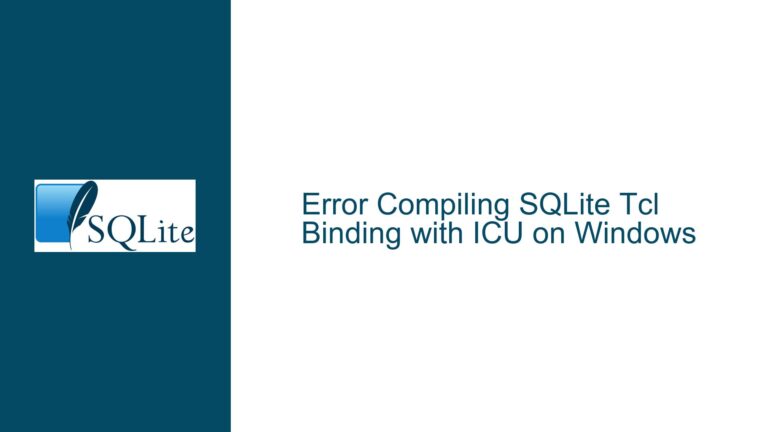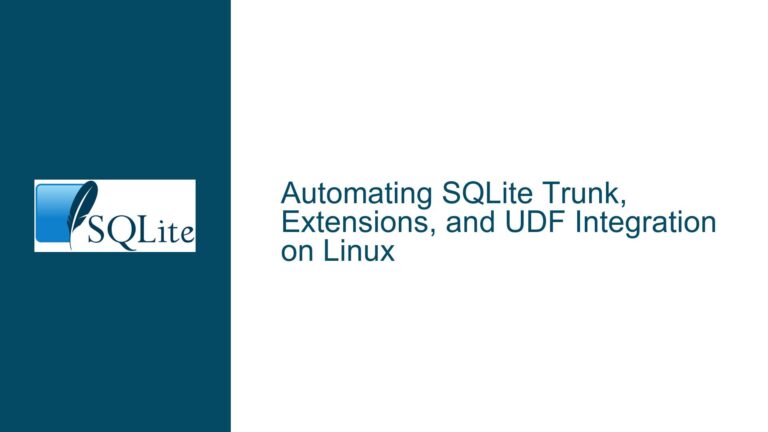SQLite Thread Safety Configuration and Build Issues on Windows
SQLite Thread Safety Configuration and Build System Challenges on Windows
The core issue revolves around the configuration of SQLite’s thread safety feature (SQLITE_THREADSAFE) during the build process, particularly on Windows platforms. The problem arises from the interplay between the build system’s handling of pthreads (POSIX threads) and the native threading mechanisms available on Windows, such as _beginthreadex() and _endthreadex(). The build system, specifically the configure script, was initially designed to enforce the presence of pthreads when thread safety is enabled, which is not always necessary or appropriate for Windows environments. This has led to complications in cross-compilation scenarios and custom build environments, such as those using Clang and LLVM-based tools instead of GCC and binutils.
The issue is further exacerbated by the fact that SQLite’s build system does not natively support non-MSVC Windows builds, and the configure script is not typically used for native Windows builds. This creates a gap in the build process for environments like MSYS2, Cygwin, and custom cross-compilation setups, where the presence or absence of pthreads can lead to incorrect configuration of the SQLITE_THREADSAFE flag. Additionally, the handling of shared library installation rules (install-so-1) in the build system does not account for Windows-specific requirements, leading to unnecessary or incorrect transformations during the installation process.
The problem is not just limited to the build system but also affects the runtime behavior of SQLite on Windows. If the SQLITE_THREADSAFE flag is incorrectly set to 0 due to the absence of pthreads, SQLite will not be able to leverage the native Windows threading APIs, leading to potential performance degradation or even runtime errors in multi-threaded applications. This is particularly problematic for environments that intentionally avoid using libwinpthread-1.dll to reduce dependencies and improve portability.
Misconfigured Thread Safety Flags Due to Pthread Dependency Checks
The root cause of the issue lies in the build system’s dependency on pthreads for enabling thread safety in SQLite. The configure script checks for the presence of pthread-related functions (pthread_create and pthread_mutexattr_init) and uses this information to set the SQLITE_THREADSAFE flag. However, this approach is not universally applicable, especially on Windows, where native threading APIs (_beginthreadex and _endthreadex) can be used instead of pthreads.
The build system’s logic assumes that the absence of pthreads implies that thread safety cannot be supported, which is not true for Windows. This assumption is embedded in the sqlite-handle-threadsafe procedure within the sqlite-config.tcl script. The procedure adds -DSQLITE_THREADSAFE=1 to the feature flags if --enable-threadsafe is set, but it also enforces the presence of pthreads by checking for pthread_create and pthread_mutexattr_init. If these functions are not found, the script raises a user error, effectively preventing the build from proceeding with thread safety enabled.
This behavior is problematic for several reasons. First, it conflates the presence of pthreads with the ability to support thread safety, which is not accurate for all platforms. Second, it does not account for the possibility of using alternative threading mechanisms, such as the native Windows APIs. Third, it creates a barrier for custom build environments that may not use pthreads but still require thread-safe operation.
The issue is further complicated by the fact that the build system does not provide a straightforward way to override these checks or specify alternative threading mechanisms. This lack of flexibility makes it difficult to adapt the build process to different environments, particularly those that deviate from the standard GCC and pthreads setup.
Correcting Thread Safety Configuration and Build System Adjustments
To address these issues, several changes are needed in the build system and configuration process. The primary goal is to decouple the thread safety configuration from the presence of pthreads and provide a more flexible mechanism for enabling thread safety on different platforms, particularly Windows.
Adjusting the sqlite-handle-threadsafe Procedure
The sqlite-handle-threadsafe procedure in the sqlite-config.tcl script needs to be modified to account for platform-specific threading mechanisms. Instead of enforcing the presence of pthreads, the procedure should check for the availability of platform-specific threading APIs and adjust the SQLITE_THREADSAFE flag accordingly. For Windows, this means checking for _beginthreadex and _endthreadex and setting the appropriate feature flags.
The modified procedure should look something like this:
proc sqlite-handle-threadsafe {} {
proj-if-opt-truthy threadsafe {
msg-result yes
sqlite-add-feature-flag -DSQLITE_THREADSAFE=1
if {[proj-is-windows]} {
# Use native Windows threading APIs
sqlite-add-feature-flag -DSQLITE_OS_WIN_THREADS
} else {
# Check for pthreads on non-Windows platforms
if {![proj-check-function-in-lib pthread_create pthread]
|| ![proj-check-function-in-lib pthread_mutexattr_init pthread]} {
user-error "Missing required pthread bits"
}
define LDFLAGS_PTHREAD [get-define lib_pthread_create]
undefine lib_pthread_create
}
} {
msg-result no
sqlite-add-feature-flag -DSQLITE_THREADSAFE=0
}
}
This modification ensures that the build system correctly identifies and uses the appropriate threading mechanism for each platform, without unnecessarily enforcing pthreads on Windows.
Handling Shared Library Installation on Windows
The build system’s handling of shared library installation rules (install-so-1) also needs to be adjusted to account for Windows-specific requirements. The current implementation applies unnecessary transformations to shared libraries on Windows, which can lead to incorrect installation paths or missing dependencies.
The install-so-1 rule in the main.mk file should be modified to skip unnecessary transformations on Windows:
install-so-1: $(install-dir.lib) $(libsqlite3.SO)
@echo "Installing $(libsqlite3.SO) to $(install-dir.lib)..."; \
cp $(libsqlite3.SO) "$(install-dir.lib)" || exit $$?; \
if [ x.dll = x$(T.dll) ]; then \
echo "... none needed"; \
elif [ x.dylib = x$(T.dll) ]; then \
rm -f libsqlite3.0$(T.dll) libsqlite3.$(PACKAGE_VERSION)$(T.dll) || exit $$?; \
dllname=libsqlite3.$(PACKAGE_VERSION)$(T.dll); \
mv $(libsqlite3.SO) $$dllname || exit $$?; \
ln -s $$dllname libsqlite3.0$(T.dll) || exit $$?; \
ln -s $$dllname libsqlite3$(T.dll) || exit $$?; \
fi
This change ensures that the installation process correctly handles Windows shared libraries without applying unnecessary transformations.
Supporting Custom Build Environments
For custom build environments, such as those using Clang and LLVM-based tools, the build system should provide additional flexibility to override default settings and specify alternative threading mechanisms. This can be achieved by adding new configuration options to the configure script, such as --enable-threadsafe-without-pthreads, which would allow users to enable thread safety without requiring pthreads.
Additionally, the build system should provide better support for cross-compilation scenarios by allowing users to specify the target platform and threading mechanism explicitly. This can be done by adding new options to the configure script, such as --with-threading-api=[pthreads|win32], which would allow users to select the appropriate threading API for their target platform.
Testing and Validation
After implementing these changes, thorough testing is required to ensure that the build system correctly handles thread safety configuration and shared library installation on all supported platforms. This includes testing on native Windows builds, MSYS2, Cygwin, and custom cross-compilation environments.
The testing process should cover the following scenarios:
- Building SQLite with thread safety enabled on Windows using native threading APIs.
- Building SQLite with thread safety enabled on non-Windows platforms using pthreads.
- Building SQLite with thread safety disabled.
- Installing shared libraries on Windows, MSYS2, and Cygwin.
- Cross-compiling SQLite for Windows using Clang and LLVM-based tools.
By addressing these issues and implementing the necessary changes, the SQLite build system can provide a more robust and flexible configuration process, ensuring that thread safety is correctly enabled on all platforms, including Windows, without unnecessary dependencies on pthreads. This will improve the portability and reliability of SQLite in a wide range of build environments.
